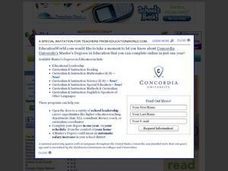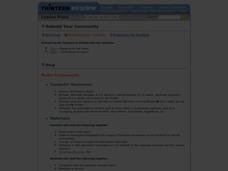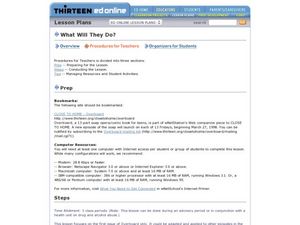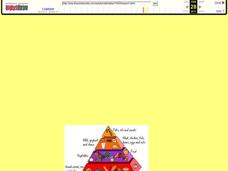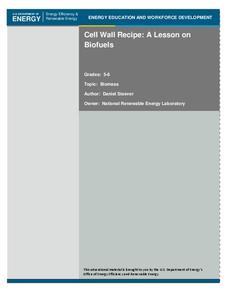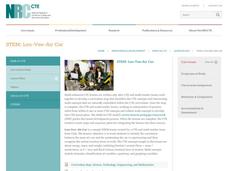Curated OER
Energy From Space: The Next Frontier
Students investigate ideas for getting energy from space. For this space-based power lesson, students read articles about ideas for alternatives to fossil fuels. Students define and give examples of vocabulary words. Students answer...
Curated OER
LCROSS Moon Mission
Young scholars read to discover the sequence of events of the LCROSS moon mission. In this space science lesson, students read an article about the LCROSS moon mission and the events that took place. After reading, young scholars...
Curated OER
My Deaf American Hero
High schoolers study and discuss famous deaf people that are role models for students who are deaf. They research a famous deaf American and create a ten frame multimedia presentation to showcase the information.
Curated OER
Students Get Animated: Make Existing Lessons Move and Motivate Students
Students study the chemical elements in a computer generated cartoon format. In this computer animation and chemistry lesson, students learn how to animate using computer programs. Students use animation to learn about the Periodic Table...
Curated OER
15 Relays for Field Days
Young scholars, in teams, participate in a variety of fun themed relay races.
Curated OER
Alas, All Human
Students define a scientist. In this ethics and science instructional activity, students read Asimov's Alas, All Human and write responses and discuss the possibilities of imperfection within science by scientists. Students discuss what...
Curated OER
Rebuild Your Community
Students explore the concept of rebuilding a community after a disaster. In this rebuilding after a disaster lesson, students discuss the role of government in rebuilding a community. Students discuss financial issues that occur when...
Curated OER
CLOSE TO HOME - Overboard
Students read a comic about a teen drug overdose that leads to death. In this drug awareness lesson, students role play characters in the story that react to the death of their friend due to drug use in an online forum. Students evaluate...
Curated OER
Food Pyramid
Students identify good nutrition. In this food pyramid lesson, students learn the basics of good nutrition, identify the six basic food groups, state the effects of the food on the human body, and learn nutritional information while...
Curated OER
Mark Twain Olympics
Students, during the last week of the year, are placed into 12 teams to represent countries of the world. All of students participate in a school-wide Olympics that involves 4 rounds of fun activities.
Curated OER
Write, Read and Play
Young scholars integrate writing, reading and movement skills. They draw from a hat a movement skill (e.g., throwing, catching, kicking, etc.), sport, or related word (e. g., heart, muscle, etc.) and create a book written on the first...
Curated OER
Get a Job
Students brainstorm a list of items needed to have a successful career. Individually, they complete a webquest in which they identify positions they might be interested in. They also practice the interview process and how to complete...
Curated OER
The Olympic Games Scavenger Hunt
In this Olympic Games worksheet, students research the Internet to locate a specific website to answer five fill in the blanks statements in connection with the Olympic Games.
Curated OER
World Series History Scavenger Hunt
In this World Series activity, students participate in an Internet scavenger hunt to locate the answers to five short answer questions associated with the history of the World Series.
Curated OER
Forces Cause Change
Third graders will gain recognition that physical relationships affect each other and that change occurs when one object acts upon another.The teacher will recognize ways in which technology can be used to enhance the understanding of...
Curated OER
Measuring in Inches
Third graders will sing 2 songs that are written and played by the teacher and relate to the task of measuring.They recognize and pick up a 1-foot standard ruler and be able to identify the marks on the ruler, including inch and parts of...
Curated OER
Science: Plate Tectonics, Faults, and Volcanoes
Eighth graders conduct Internet research on plate tectonics, faluts, and volcanoes. In groups, they compile information related to teacher-provided questions. Students write papers detailing their findings and make oral presentations...
Curated OER
Creating The Virtual Model
Students engage in a lesson that is about the concept of earthquake design. The lesson includes the integration of technology and how it can be used to create buildings and structures for withstanding an earthquake. Students also define...
Curated OER
Cell Wall Recipe: A Lesson on Biofuels
Biotech engineers discover that changes in the DNA code for cell wall formation can help create crops better suited for biofuel production. They extract DNA from wheat germ. They decode paper strips with codes and relate the activity to...
Curated OER
A Light in the Storm
Examine the genre of historical fiction while reading A Light in the Storm. They extract events in chronological order to make a timeline. Then, they use information in the book important to the characters to create a presentation of an...
NPR
Partners In Winning The War Lesson Plan
How propaganda was used to change the concept of women's roles during World War II is the focus of an online exhibit provided by the National Women's History Museum. Packed with propaganda posters and pictures, the packet points out how...
Curated OER
Who's The Boss?
Upper elementary and middle schoolers research and analyze some different types of governments. Democracies, Monarchies, and Dictatorships are some of the types that are looked at. Learners use the Internet to gather information that...
National Research Center for Career and Technical Education
STEM: Lou-Vee Air Car
A comprehensive lesson plan on acceleration awaits your physicists and engineers! Two YouTube videos pique their interest, then sample F=ma problems are worked and graphed. The highlight of the lesson plan is the building of a Lou-Vee...
Curated OER
The Beginning of the War -- Two Views on Texas
Young scholars discuss the factors that can lead to war, and the motivations of countries going into war. They research two viewpoints on Texas during the Mexican War and participate in a debate with their classmates.






